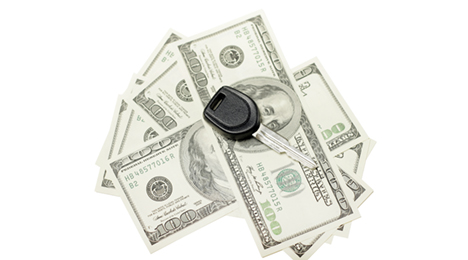The Consumer Financial Protection Bureau and Department of Justice just took a big bite out of the F&I income Honda dealerships can generate through the financing of vehicle installment contracts by their captive.
CFPB and DOJ officials said on Tuesday that they resolved an action with American Honda Finance Corp. they believe will put new measures in place to address discretionary auto loan pricing and compensation practices.
The agencies indicated Honda’s past practices resulted in thousands of African-American, Hispanic, and Asian and Pacific Islander borrowers paying higher interest rates than white borrowers for their installment contracts, without regard to their creditworthiness.
As part of the order, officials said Honda will change its pricing and compensation system to substantially reduce dealer discretion and minimize the risks of discrimination, and will pay $24 million in restitution to affected borrowers.
According to the consent order, Honda’s captive will limit dealer participation to 125 basis points for installment contracts with terms of 60 months or less. For contracts longer than 60 months, the cap is set at 100 basis points.
Officials maintained that Honda permitted dealers to mark-up consumers’ interest rates as much as 2.25 percent for contracts with terms of five years or less, and 2 percent for contracts with longer terms.
The agencies explained the enforcement action is the result of a joint CFPB and DOJ investigation that began in April 2013. The agencies investigated Honda’s indirect auto lending activities’ compliance with the Equal Credit Opportunity Act, which prohibits creditors from discriminating against loan applicants in credit transactions on the basis of characteristics such as race and national origin.
The investigation concluded that Honda’s policies:
• Resulted in minority borrowers paying higher dealer markups: Honda violated the Equal Credit Opportunity Act by charging African-American, Hispanic, and Asian and Pacific Islander borrowers higher dealer markups for their auto contracts than non-Hispanic white borrowers. These markups were without regard to the creditworthiness of the borrowers.
• Injured thousands of minority borrowers: Honda’s discriminatory pricing and compensation structure meant thousands of minority borrowers from January 2011 through July 14, 2015 paid, on average, from $150 to over $250 more for their auto loans.
Reaction from Honda
In a statement posted on its website, American Honda Finance officials said their consent agreement with federal agencies, “shows our commitment to work together to be part of the solution and to establish the path forward that best supports our Honda and Acura customers and dealers with clear and convenient financing options.
“AHFC strongly opposes any form of discrimination, and we expect our dealers to uphold this principle as well. We firmly believe that our lending practices have been fair and transparent,” they continued.
“AHFC has a difference of opinion with the CFPB and the DOJ regarding the methodology used to make determinations about lending practices, but we nonetheless share a fundamental agreement in the importance of fair lending,” the officials went on to say.
Honda Finance didn’t mention the specific figures regarding dealer participation that the CFPB and DOJ did in the consent order. Rather, officials said, “In cooperation with the CFPB and the DOJ, AHFC will be working closely with our Honda and Acura dealers in proactively adjusting our pricing programs to continue to give our customers the ability to choose the loan that is best for supporting their purchase of Honda and Acura products.
“As part of this new program, AHFC will announce later this year adjustments to our caps for dealers in setting the rate for retail installment contracts lower than the present level,” they continued.
“We will be implementing this change in combination with other adjustments and modifiers in a way that continues to support our Honda and Acura dealers' present business compensation with a full array of financing options,” captive officials added.
American Honda Finance also pointed out that as a result of this settlement, no civil penalties have been assessed.
Along with establishing a $24 million fund that will be used to compensate customers identified by the CFPB and the DOJ, the captive indicated it will continue to enhance our long-standing commitment to support financial literacy education and ensure that the future generation of customers is well informed about the process of financing vehicles.
More details of enforcement action
Officials reiterated the Dodd-Frank Wall Street Reform and Consumer Protection Act, and federal fair lending laws, authorize the CFPB and DOJ to take action against creditors engaging in discrimination.
The CFPB’s order was filed on Tuesday as an administrative action, and DOJ’s proposed order was filed in the U.S. District Court for the Central District of California.
The agencies contend the measures provided in the orders will help ensure that discrimination does not increase the cost of auto loans for consumers on the basis of race and national origin.
Under the CFPB order, Honda must:
• Substantially reduce or eliminate entirely dealer discretion: Honda will reduce dealer discretion to mark-up the interest rate to only 1.25 percent above the buy rate for contracts with terms of 5 years or less, and 1 percent for auto loans with longer terms. Honda also has the option under the order to move to non-discretionary dealer compensation.
“The bureau did not assess penalties against Honda because of Honda’s responsible conduct, namely the proactive steps the company is taking that directly address the fair lending risk of discretionary pricing and compensation systems by substantially reducing or eliminating that discretion altogether,” CFPB officials said.
• Pay $24 million in damages for consumer harm: Officials said Honda will pay $24 million to a settlement fund that will go to affected African-American, Hispanic, and Asian and Pacific Islander borrowers whose auto loans were financed by the captive between January 2011 and Tuesday.
• Administer and distribute funds to victims: Officials said Honda, through American Honda Motor Co., will contact consumers, distribute the funds and ensure that affected borrowers receive compensation. Honda will make reports to the bureau regarding this victim compensation activity.
“The CFPB is committed to creating a fair marketplace for all consumers, and other auto lenders should take note of today’s action,” CFPB director Richard Cordray said. “Honda’s proactive decision to move to a new pricing and compensation system demonstrates industry leadership and represents a significant step towards protecting consumers from discrimination.”
The head of DOJ’s Civil Rights Division, principal deputy assistant attorney general Vanita Gupta, also reacted to Tuesday’s development.
“We commend Honda for its leadership in agreeing to impose lower caps on discretionary markups and for its commitment to treating all of its customers fairly without regard to race or national origin,” Gupta said.
“We recognize that dealerships perform a valuable service in connecting customers with lenders and that they should be fairly compensated for that service,” Gupta continued. “We believe that Honda’s new compensation system balances fair compensation for dealers and fair lending for consumers.
“We hope that Honda’s leadership will spur the rest of the industry to constrain dealer markup to address discriminatory pricing,” Gupta went on to say.
In March 2013, the CFPB pointed out that it issued a bulletin explaining that it would hold indirect auto finance accountable for “unlawful discriminatory” pricing. Bureau officials reiterated the bulletin also made recommendations for how indirect auto finance companies could ensure that they were operating in compliance with fair lending laws.
Last September, the bureau also issued an edition of supervisory highlights that explained that the bureau’s supervisory experience suggests that significantly limiting discretionary pricing adjustments may reduce or effectively eliminate pricing disparities.
“Substantial limits on discretionary pricing like those imposed by today’s order can address the type of fair lending risk identified in the CFPB’s bulletin and supervisory highlights,” officials said.
Officials mentioned Tuesday’s action is part of a larger joint effort between the CFPB and DOJ to address discrimination in the indirect auto lending market. In December 2013, the CFPB and DOJ took an action against Ally Financial and Ally Bank that ordered Ally to pay $80 million in consumer restitution and an $18 million civil penalty.
What law enforcement considers to be deceptive advertising associated in part with vehicle financing is continuing to hit New York dealerships in the pocketbook.
New York attorney general Eric Schneiderman announced two separate settlements on Tuesday involving 23 franchised dealerships and financial penalties surpassing $340,000.
The larger of the two agreements is requiring 22 dealerships in Nassau and Suffolk counties to pay $310,000 in restitution and penalties to resolve false advertising claims. Schneiderman said the dealerships, all affiliated with Atlantic Automotive Group based in West Islip, N.Y., “persistently defrauded” consumers with “misleading” promotions and “fraudulent” sales tactics.
In total, the attorney general’s Nassau and Suffolk regional offices received more than 250 complaints regarding the dealerships and their advertising and sales practices.
Schneiderman indicated Atlantic Automotive Group generated advertisements to be mailed to thousands of Nassau and Suffolk County consumers, with approximately 500,000 promotional items in total distributed by direct mail. The advertisements contained a scratch off game card, a pull tab game card, or a “Triple Diamond” game card where consumers could win a cash prize, a free vehicle, a flat-screen television or an Apple iPad.
A winning ticket contained three like symbols but it did not explain what, if anything, the consumer won. Instead, consumers were instructed to bring the game card to the dealership during event times in order to claim their prize.
“The game cards were deceptive and had the capacity to mislead consumers to believe that they were guaranteed winners of valuable prizes. In fact, virtually all of the consumers did not win a prize at all,” Schneiderman’s office said.
The Empire State attorney general declared Atlantic Automotive Group also misled consumers through various other deceptive practices by:
— Publishing print advertisements which contained misleading or illegal features in violation of the attorney general’s auto advertising guidelines and a previous assurance of discontinuance entered into with two dealerships in the Atlantic Automotive Group.
— Obtaining signatures on contracts of sale and financing agreements from consumers who mistakenly believed that they were filling out paperwork for vehicles they had won as part of the “Triple Diamond”, “scratch-off game card”, or “pull tab game card” promotions.
— Offering false monetary discounts off the sales price of a vehicle, by selling the vehicle at a high retail sales price which had the effect of nullifying the value of the discount offered.
—Charging consumers for extended warranties, vehicle maintenance contracts, and administrative fees related to the purchase of vehicles that consumers did not want, had no knowledge of, or were told there was no charge for these products.
—Providing consumers with blank documents or partially blank documents for their signatures and later filling out the documents with figures and terms other than what was agreed upon by the consumers.
—Failing to give all necessary documents to consumers at the time of purchase.
—Making various false or misleading statements to consumers during high-pressure sales transactions.
—Encouraging consumers to apply for loans that they could not afford.
—Refusing to refund deposits that had been made by consumers.
The dealerships included are:
— Millennium Honda, located at 286 N. Franklin St., Hempstead
— Millennium Toyota, located at 257 N. Franklin St., Hempstead
— Millennium Hyundai, located at 220 N. Franklin St., Hempstead
— Advantage Hyundai, located at 440 Plainview Road, Hicksville
— Advantage Toyota, located at 400 W. Sunrise Hwy, Valley Stream
— Advantage Honda, located at 1260 Northern Blvd., Manhasset
— Atlantic Volkswagen, located at 555 Sunrise Hwy, West Islip
— Atlantic Audi, located at 251 Sunrise Hwy, West Islip
— Atlantic Nissan, located at 193 Sunrise Hwy North Service Road, West Islip
— Atlantic Hyundai, located at 193 Sunrise Hwy North Service Road, West Islip
— Atlantic Chrysler Jeep Dodge Ram, located at 130 Sunrise Hwy, West Islip
— Atlantic Toyota, located at 200 Sunrise Hwy, Amityville
— Atlantic Chevrolet Cadillac, located at 1350 Sunrise Hwy, Bay Shore
— Atlantic Honda, located at 1391 Sunrise Hwy, Bay Shore
— Lexus of Rockville Centre, located at 700 Sunrise Hwy, Rockville Centre
— Lexus of Massapequa, located at 4950 Sunrise Hwy, Massapequa Park
— Audi of Lynbrook, located at 843 Sunrise Hwy, Lynbrook
— Huntington Chevrolet, located at 370 Oakwood Road, Huntington Station
— Huntington Toyota, located at 1030 E. Jericho Turnpike, Huntington Station
— Mid-Island Hyundai, located at 1815 Middle Country Road, Centereach
— South Shore Hyundai, located at 360 W. Sunrise Hwy, Valley Stream
— Massapequa Nissan, located at 3660 Sunrise Hwy, Seaford
“New Yorkers have a right to navigate the car buying process without being targeted by false and misleading promotions and sales practices,” Schneiderman said.
Hyundai store settles separate action
In another announcement also released on Tuesday, Schneiderman said his office reached a settlement with Hyundai of White Plains. An investigation by the attorney general’s office found that the dealer used deceptive and misleading advertising practices in both its print and online ads.
Among its deceptive practices, officials indicated the dealership widely promoted sale and lease prices that were illusory because they included discounts or rebates that were not available to most consumers, and thus, did not represent the actual sale or lease prices.
Tuesday’s announcement showed the dealership has agreed to reform its advertising practices and pay $32,500 in costs and penalties to New York State.
Schneiderman stated Hyundai of White Plains regularly advertised prices which included discounts or rebates such as:
— A “military” rebate, which was available only to certain current or former military personnel
— A “college graduate” rebate, which was available only to recent college graduates
— A “loyalty” rebate, which was available only to customers who had purchased a new vehicle within the last six months
— An “HMF” discount, which was available only to consumers who financed their purchase.
In some cases, Schneiderman calculated the discounts and rebates totaled as much as $4,500, so the actual price of the vehicle for many consumers was significantly more than advertised.
He added the only disclosure that the advertised prices included these rebates and discounts was in tiny footnotes at the bottom of the advertisements.
The attorney general's investigation also cited Hyundai of White Plains for other problems with its ads, and the settlement requires the dealership to reform those practices as well. These problems included:
— Using footnotes or asterisks that contradict, confuse or materially modify a principal message of an ad
— Failing to clearly and conspicuously provide certain required disclosures for lease or finance terms, such as the amount or percentage of any down payment
— Restricting a rate or price to a “qualified buyer” or “qualified lessee” without disclosing such qualifications
— Failing to disclose the duration of sales and promotions that were time-limited.
“When shopping for a car, New Yorkers deserve to be dealt with honestly and fairly — not misled by false advertising,” Schneiderman said. “My office will not tolerate car dealerships that mislead consumers with ads featuring inaccurate, artificially low prices.”
Pattern in New York
Tuesday’s announcements arrived only about a month after Schneiderman’s office raked in a multi-million dollar settlement with three dealerships in a development associated with the alleged unlawful sale of credit repair and identity theft prevention services, and other “after-sale” items.
Back on June 17, officials explained that agreement, which returned more than $13.5 million in restitution to consumers, concluded an investigation into a trio dealerships for the alleged sale of finance office products to 15,000 consumers — items that in some cases added more than $2,000 in “hidden costs and fees” onto the sale or lease price of a single vehicle.
When SubPrime Auto Finance News spoke with Dealertrack Technologies associate general counsel Randy Henrick about that development, he cautioned New York dealers about how Schneiderman’s office is approaching this area.
“I think the message he’s sending is clear: If New York auto dealers violate the law, particularly if they violate it in ways that are indefensible, they’re going to pay a hefty price and it’s not going to be just a cost of doing business,” Henrick said in a previous report about how the impact of developments in New York could ripple elsewhere.
Henrick recently conducted a webinar where he dissected the Federal Trade Commissions latest actions involving dealer advertising and how dealerships can avoid deceptive ad practices. A recording of that session is available here.
While the Office of the Comptroller of the Currency acknowledged vehicle installment contract delinquencies are are at “manageable” levels now, FICO’s analytic team recently offered a pair of recommendations to help finance companies protect profitability in case those conditions deteriorate.
The first recommendation FICO shared in a recent blog post was how finance companies should identify customers likely to become delinquent and take preemptive action.
“By taking a proactive and analytic approach to customer management, auto financing sources can prepare for the likelihood that certain customers may go delinquent and require greater attention,” FICO said.
“Understanding who these customers are, based on their behavior and risk profile, and then taking informed actions to support the relationship can be mutually beneficial,” analysts continued.
“Financing sources will see increased profit with reduced risk. Borrowers will feel supported and avoid a negative brand experience,” they added.
Next, FICO also suggested that finance companies leverage collection treatments that maximize the value of resources and other operational expenses.
“Predictive analytics can be used to identify the most effective recovery programs and get debtors back on the road to repayment,” FICO said.
“Applying risk-based strategies has proven successful to increase the amounts collected; they also keep operating costs down by proportionally focusing system treatments — including letters and collector staff efforts — on rewarding activities,” analysts continued.
“Analytic segmentation can identify customers likely to self-cure so that costly resources remain focused on accounts that will benefit from action,” they went on to say.
More recommendations and commentary from FICO can be found here.
Cox Automotive chief economist Tom Webb didn’t reference the Federal Reserve’s revamped consumer credit report that includes more details about auto financing when he conducted his quarterly conference call this week.
But the metrics the Fed reported probably didn’t provide Webb with much evidence to alter his assessment about lengthening new-vehicle installment contracts.
The Fed indicated the average new-car deal in March contained terms lasting 65 months, the same duration as the first quarter of this year and the fourth quarter of last year.
The Fed added in its report that officials said covers most captive and non-captive finance companies that the average amount financed in these new-model contracts was $27,272 in March, which was flat compared with the first-quarter reading and $517 higher than the fourth-quarter figure.
Furthermore, the Fed pinpointed the average APR on contracts for new vehicles at 5.2 percent in March; again the same reading as Q1.
In his Q&A segment that also delved into where wholesale prices might be headed, Webb answered questions about new-vehicle sales and the financing environment that helped the industry sell new cars and light-duty trucks at a seasonally adjusted annual rate (SAAR) of 17.1 million in June.
“Longer terms loans,” Webb said as he paused for a couple seconds before continuing with, “I have a lot of thoughts about that. Personally, I don’t like them. I don’t think the lenders are going to get too burned on them. The underwriting is still pretty good. People are paying their loans.
“Customers probably won’t hold the car until the note is paid off so lengthening the trade cycle, I’m not too sure what it does for that,” Webb continued.
Webb then followed up with the part about these growing contract terms that solidified his opinion.
“What bothers me about them most is it probably hurts customer satisfaction in the long-run,” he said.
“New-vehicle buyers want to trade out on a relatively short period of time,” Webb continued. “Wholesale prices obviously are going to show some weakness. There are going to be people who put themselves into a long-term loan who are going to find it rather painful to get out into another new vehicle. They’re going to have little equity, no equity or negative equity.”
Western Funding closed the first half of the year with the biggest origination month in company history, fueling plans to grow its footprint and workforce.
Western Funding — a specialized subprime automotive finance company and subsidiary of Westlake Financial Services — reported that it funded 906 deals in June for $11.2 million worth of contracts.
The company tabulated that its portfolio size now stands at $84 million, a 154-percent increase over last year. Western Funding president Guerin Senter highlighted the portfolio continues to outperform expected losses.
“We are excited to announce June as our biggest originations month, as it makes an immediate impact on the growth of our company,” Senter said.
“We attribute this strategic growth to the development of our sales team and expansion into new markets,” he continued.
Western Funding currently operates in 18 states and has a 45-person sales force. The company’s goal is to be operating in all 50 states by the end of 2016.
Western Funding plans on hiring another 30 sales reps by the end of the year, with the majority of those starting in August.
“We’re just starting to gear up our next start-group and embark on the interviewing and recruiting process right now,” Senter said.
Senter emphasized Western Funding’s sustainable growth requires a need for new talent to lead the company into prosperous national growth. Individuals with what the company calls a “purpose and a passion” for the industry and interested in joining the Western Funding team are encouraged to call the company directly at (702) 322-9883.
In moves that became effective July 1, Toyota Financial Services announced on Thursday that Mike Groff, president and chief executive officer of TFS USA, was appointed to be CEO of the Toyota Financial Services Americas Region.
The captive indicated Groff — who first joined Toyota in 1983 — will now oversee TFS operations in the mainland United States, Canada, Puerto Rico, Mexico, Brazil, Venezuela and Argentina.
Groff has held the role of president of TFS USA since 2013. Last year, the company pointed out Groff initiated plans for TFS USA's headquarters move to Plano, Texas to better align its business with other Toyota North American affiliates.
In another move, Toyota Financial Services also announced today that Chris Ballinger, the captive’s senior vice president and chief financial officer, will assume additional responsibility in the new global leadership role of chief officer, management innovation.
In this role, the company indicated Ballinger will be helping to guide global TFS strategy to address future market trends and business model requirements.
“Mr. Ballinger's appointment to this role reflects recognition of the impact and influence of the North American market for financial services globally, as well as Mr. Ballinger's leadership and innovation,” company officials said.
How much F&I income dealerships can generate might have sustained another impediment stemming from a published report that surfaced this week.
SubPrime Auto Finance News connected with Ben Saul, who is a partner in Goodwin Procter’s consumer financial services litigation group in Washington, D.C., to discuss the implication of the captive finance companies for Honda, Nissan and Toyota potentially entering into consent decrees with the Consumer Financial Protection Bureau and the Department of Justice.
American Banker reported that it obtained confidential documents that indicated American Honda Finance Corp., Toyota Motor Credit Corp. and Nissan Motor Acceptance Corp. would accept as part of consent decrees involving unintentional discrimination that the captives would reduce dealer participation. The report said the markup would be cut from about 200 basis points per vehicle installment contract down to 100 basis points.
After seeing the online report, Saul emphasized, “It remains to be seen what the actual consent orders will say. I think it’s important to mindful of that; or even if there will be consent orders. It’s a process. Both parties have to agree. You file a consent order. The judge has to enter it. There’s a whole process that hasn’t played out. We’re way out in front of it.”
But presuming these documents preview what the captives and regulators finalize, Saul told SubPrime Auto Finance News during a phone interview on Wednesday that the development “would be a significant move for the industry. It may be a harbinger for other industry participants to move markup caps down, which is of course something that in dribs and drabs has been happening since the indirect auto fair lending examinations and investigations really kicked off with a fervor several years ago.
“I would expect that’s how the industry will react,” he added.
While none of the captives nor the regulators have yet to make official announcements, Saul leveraged his experiences to explain the current stage. He has represented clients in matters involving not only the CFPB and DOJ, but also situations associated with the Federal Trade Commission and the Securities and Exchange Commission.
“These investigations are fairly advanced. The article referenced internal memorandum provided internally at the CFPB seeking authorization for terms and conditions of the consent decree,” Saul said. “That tells you that negotiations surround the consent decree are at an advanced stage presumably.
“Although anything can happen in a negotiation, we’re likely to see a negotiated resolution soon in the near term,” he continued.
While the possible change in dealer participation at these three captives, the report doesn’t indicate a the finance arms for Honda, Nissan and Toyota are preparing to switch to a flat-fee structure, which BB&T Dealer Finance chose to do last month without a regulatory demand.
“If this was a move to flats, it would be tremendously significant. But it does appear that the agreement in the consent order will stop short of that more dramatic move,” Saul said.
“There’s no question that there is a current in the industry that has been moving for some time moving in the direction of either reduced markup caps or either going one step further, the imposition of a flat-fee or fixed structure,” he continued.
“I think that movement is picking up momentum but a movement to flats in particular would be such a seismic shift in the structure of these transactions that I suspect, given the breadth and scope of the industry players, that many will continue to be resistant to a movement to flat fees,” Saul went on to say.
“So as long as that is the case, the momentum will be limited. Certainly I think the momentum is picking up steam, but it probably has not yet reached a critical mass that you’re going to see a broad-based shift in how this compensation model works,” he concluded.
All of those vehicle installment contracts with terms of 72 months or longer are prompting one of the top federal regulators of commercial banks to keep a close eye on auto financing.
The latest report from the Office of the Comptroller of the Currency indicated that agency officials continue “to closely monitor underwriting practices and loan structures.” They made the statement as part of the 41-page semiannual risk perspective by the OCC’s national risk committee.
The OCC based its assessment on data through the end of last year, which showed total outstanding balances in the industry’s portfolio reached $956 billion, increasing 1.4 percent for the quarter and 8.8 percent for the year. The OCC acknowledged outstanding balances have grown for 17 straight quarters, a trend that began in the third quarter of 2010.
Officials pointed out auto origination volumes at commercial banks followed a similar pattern with a 9.5-percent increase during 2014 and a “long-term pattern mirroring the industry.” To date, they added delinquency and loss rates remain within “manageable” levels, aided by declining unemployment, low gasoline prices and “resilient” used-vehicle prices.
While installment contract performance currently remains “reasonable,” the OCC discussed what negatives might be percolating within the industry.
“Extended rapid growth is difficult to maintain and can sometimes mask early signs of weakening credit quality,” officials said in the report. “Too much emphasis on monthly payment management and volatile collateral values can increase risk, and this often occurs gradually until the loan structures become imprudent.
“Signs of movement in this direction are evident, as lenders offer loans with larger balances, higher advance rates and longer repayment terms,” they continued. “Each on its own may be manageable depending on the particular case, but combining the factors substantially increases risk.”
As dealer finance office managers and finance company underwriters often see, those contract terms regularly need to be stretched to place the buyer into an affordable monthly payment. The OCC reiterated this practice can increase risk to banks and borrowers.
The agency mentioned 60 percent of auto loans originated in the fourth quarter of 2014 had a term of 72 months or longer.
“Extended terms are becoming the norm rather than the exception and need to be carefully managed,” officials said.
The OCC noted in its reported collateral advance rates are a concern, too.
The agency referenced Experian Automotive data on origination loan-to-value (LTV) ratios, which showed average advance rates were “well above” the value of the vehicles financed.
In the fourth quarter of 2014, the average LTV for used vehicle contracts was 137 percent. Moreover, advance rates for borrowers across the credit spectrum are trending up, with used vehicle LTVs for subprime borrowers (individuals with credit scores 620) averaging nearly 150 percent at the end of 2014.
“Sales of add-on products such as maintenance agreements, extended warranties, and gap insurance are often financed at origination. These add-on products in combination with debt rolled over from existing auto loans contribute to the aggressive advance rates,” the OCC said.
The regulator closed its report segment focused on the auto space by projecting how commercial banks might act going forward.
“As in the mortgage markets, the OCC expects banks to fully consider cycles and trends in the auto markets and respond in a prudent and sound manner,” officials said.
“Underwriting standards and product structures established in times of low interest rates and unusually high used car values may not prove prudent when conditions normalize or during times of stress,” they continued. “Competitive factors are important realities, but lenders also need to consider the results objectively and ensure that loan terms, underwriting standards, and portfolio concentrations remain within established and prudent risk appetite levels.”
The entire OCC risk report can be downloaded here.
CarMax Auto Finance reported “better than anticipated” loan charge-offs that had a favorable impact on both the provision for loan losses and the ending allowance for loan losses during the first quarter of its current fiscal year. The performance prompted investment analysts to question CarMax leadership about the possibility of the company’s captive buying deeper down the credit spectrum and expanding its ongoing venture into subprime auto financing.
Chief financial officer and executive vice president Tom Reedy was quick to stop that line of thinking that lower charge-offs would trigger more aggression by CAF.
“I think the two are actually unrelated,” Reedy said according to a transcript of last week’s company conference call posted by SeekingAlpha.com.
“We’re looking at the subprime test almost as a different line of business with a different pool of credit,” Reedy continued. “And as we’ve talked about before, we’re constantly testing within our core CAF business different pockets of credit, both pricing and what we'll approve on an ongoing basis. To the extent it makes sense and we keep the profile of the portfolio intact, then we'll roll those things out.
“As far as the current environment having an impact on that, these are anywhere from five to six-year loans,” he went on to say. “I think the results in any one quarter or a couple of quarters aren’t anything to go out and swing your credit policy for what you’re going to be collecting in five years.”
When the analysts followed up, Reedy addressed why charge-offs improved at least during the most recent quarter.
“The losses are really a combination of how many people are going bad and how well we’re doing recovering funds from those loans that have gone bad,” Reedy said. “We’ve had some success in doing a little bit better on the recovery side, but the vast majority of what we’re seeing in loss performance is that just fewer people are going bad. I think that’s not inconsistent with what’s going on in the lending industry in general right now, at least, at the higher credit level.”
CAF followed the general upward track Reedy referenced. Compared with last year’s first quarter, CAF income increased 15.3 percent to $109.1 million. Management indicated the improvement was driven by an increase in average managed receivables and continued favorable loss experience, partially offset by a lower total interest margin percentage.
The company added average managed receivables grew 17.2 percent to $8.66 billion.
And CarMax wants receivables to grow, especially as the quality of consumer credit company dealerships see from potential buyers continues to improve.
“One of our main goals at CarMax is to make sure that when customers show up at the store that they have access to credit,” president and chief executive officer Tom Folliard said.
“We always talk about global approval rating, which is of applicants, how many get an approval from one of our lenders starting with CAF and then heading down through all of our other partners,” Folliard said. “And that number is over 90 percent. So we’re pretty pleased with the credit offering that we have for our customers when they show up at the store, whether it’s through CAF or one of our partners.”
For franchised and independent dealerships that use BB&T Dealer Finance, a segment of BB&T Dealer Financial Services, flat-fee compensation is coming your way.
On Thursday, the commercial bank announced the launch of what it dubbed “a nondiscretionary dealer compensation program, providing a competitive automobile financing program that eliminates pricing discretion in the consumer transaction.”
Officials indicated the dealerships using BB&T for consumer financing will no longer allow for dealer markup on retail installment sales contracts. BB&T Dealer Finance will instead offer a flat-fee dealer compensation program.
The program changes will go into effect on July 1.
In a message to SubPrime Auto Finance News, BB&T corporate communications strategist Brian Davis noted there were 3,903 active dealers using the bank’s platform as of May 31.
Davis also mentioned the policy change does not impact Regional Acceptance Corp., the division of BB&T Dealer Financial Services that specializes in subprime financing. He noted Regional Acceptance already prohibited dealer markup.
According to the company’s latest financial statement, BB&T Dealer Financial Services’ net income was $43 million for the first quarter of this year, an increase of $8 million above the earlier quarter. Segment net interest income increased $11 million, primarily driven by growth in the Dealer Finance and Regional Acceptance loan portfolios and the inclusion of dealer floor plan loans in the segment during the current quarter. The allocated provision for credit losses decreased $9 million, primarily due to lower charge-offs related to the non-prime automobile loan portfolio.
The decision by BB&T comes on the heels of the Consumer Financial Protection Bureau finalizing its rule governing “larger participants” in auto financing.
“We are committed to the fair and equal treatment of all consumers," BB&T Dealer Financial Services manager Derek Lane said in a statement.
“The automobile finance industry provides a valuable service, and we highly value our long-standing dealer relationships,” Lane continued. “This new program will strengthen the process long-term for both consumers and our dealer clients."












